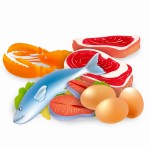Dietary Protein – 3 Things to Consider
 Regardless of your fitness level, age, or sex it’s important to consider these three factors about dietary protein intake.
Regardless of your fitness level, age, or sex it’s important to consider these three factors about dietary protein intake.
- Quality – The best quality proteins come from animal sources, called complete proteins as they contain all the essential amino acids (the building blocks of protein) required by the body on a daily basis. Consider low –fat dairy, eggs, lean meats and fish. Plant –based proteins are incomplete proteins (soy, legumes, seeds, nuts etc) do not individually contain all the essential amino acids. These proteins need to be paired with one or more complementary proteins to make a complete protein source. They do not however, need to be consumed at the same meal but the same day.
- Quantity – About 35% of total daily calories, which is roughly 46-56 g/day of high quality protein for generally healthy adults.
- Timing – In general, it is best to evenly spread out your protein consumption through the day in three meals. However, if you are looking to lose fat weight or maintain your weight you may want to consider eating more of your daily protein at breakfast to help satiate your appetite longer and prevent overeating later on. If your goal is to gain strength and/or build muscle mass you may want to consider consuming about 20 grams of high quality protein post workout. Low-fat dairy or eggs are a great source of the amino acid leucine, which plays a key role in enhancing muscle repair and recovery.
If you frequent the local fast food joint OR maybe you’re a strict vegetarian, you may want to do some research on your current protein choices and determine if you’re fueling yourself with the best quality, the correct amount, and the best times to allow top performance from your body on a daily basis.



















